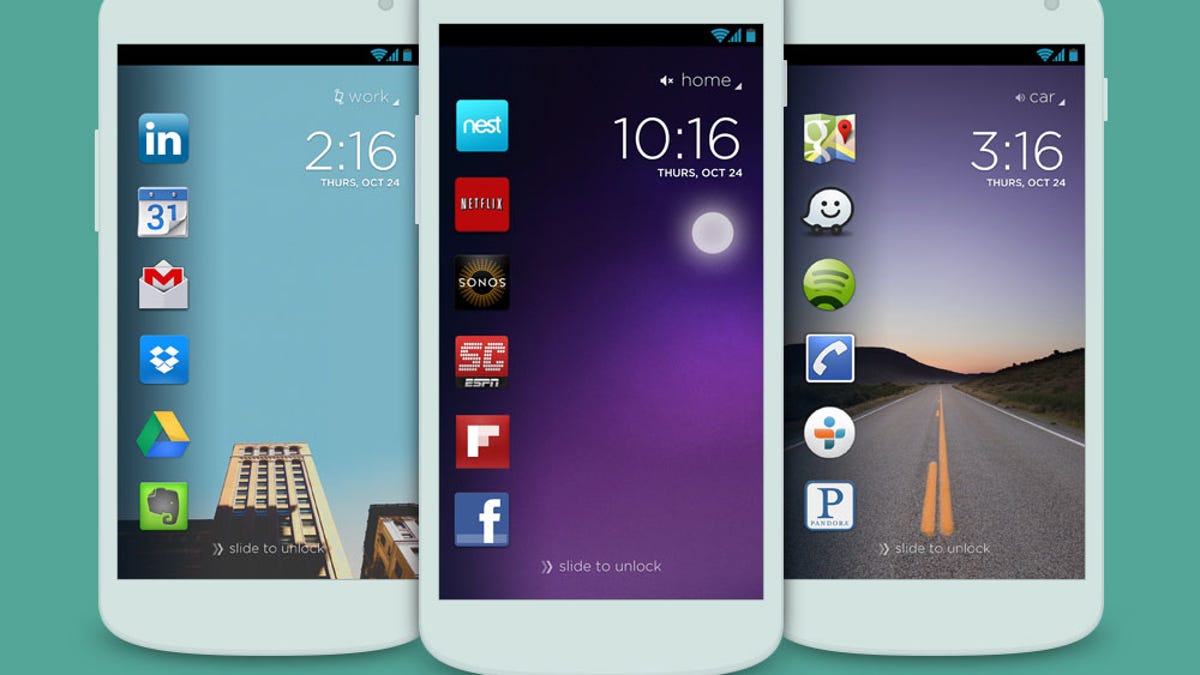Startup Cover bets on Android's market clout, flexibility
A trio of veterans from Google, Facebook, and Yahoo tries to make Android phones more useful by anticipating the apps you want the moment you wake up a device. Something they couldn't do on iOS.

Why do iOS users get all the new apps first?
Many companies get their start on Apple's mobile market, but a start-up called Cover that's launching Thursday hopes to find profits from the increasingly powerful and widely used Android instead. The company's software, free and beginning closed beta testing Thursday, is designed to make it easier and faster to use the app you want when using Google's operating system.
Cover shows a six-item list of a person's most-used apps down the left edge of a phone's lock screen. Tapping one of the icons launches its app immediately, and sliding an icon toward the right lets you peek quickly at details of that app -- e-mail inboxes, city maps, calendar appointments, and so on. The app tries to anticipate what you'll need so you'll be one step closer to getting what you need on the phone.
A key part of the idea is contextual awareness. Cover figures out whether you're at home, at work, or on the road and changes its app list accordingly. It learns what apps you prefer in each location. And it also adjusts apps by circumstances such as plugging in headphones, which means you'll likely want music-related apps, or holding the phone in landscape orientation, which could mean you want to take a photo.
"We're trying to make it easier for people to get to the right apps at the right time," said company Chief Executive Todd Jackson, a Google and Facebook veteran who co-founded Cover. That chore is getting harder as people install and use more and more software hidden among endless grids of icons.
People with Android 2.3 or later can request access to the Cover beta version on the company's Web site. It's available for free, but the company hopes to make money through other means such as spotlighting new apps or promoting ones they've installed but not used. Another idea, Jackson said, is licensing the interface to smartphone makers.
The business case is compelling enough to attract $1.7 million in seed funding from: First Round Capital, Harrison Metal Capital, Max Levchin, Scott Banister, Charlie Cheever, Keith Rabois, Dave Girouard, and Alex Franz.
Jackson, along with co-founders Edward Ho and Gordon Luk, are betting not just on their idea, but on Android, too.
"Companies are still focused on iOS, but users are moving to Android," Jackson said. "I was at Facebook when the numbers crossed and there were more Android users than iOS users. It's never going back."
Cover therefore has tied its fortunes to those of Google's mobile OS. "Android is this tidal wave in terms of number of users and growth. It's not far-fetched to imagine that in a couple years there are going to be billions of Android users," he said. Attracting even a tiny fraction of those users means the company could still have 10 million users.
Jackson, a Stanford graduate, has a high-cred resume. He was a group product manager for Gmail at Google from 2007 to 2011, and a Facebook product manager from 2011 to 2012 where he led the redesign of the social network's all-important News Feed. But he decided mobile software was the next place to go, and that Android was the way to make a business there.
Ho, Cover's chief technology officer, was a senior engineer on the Yahoo Pipes project before becoming a Google+ product director from 2011 to 2012. And Luk founded Upcoming.org, which Yahoo acquired in 2005, and more recently the game developer Goodhustle Studios.
Judging context
In the future, Cover should get even more nuanced in judging context and acting on that information. "We want to be even more fine-grained in how we do app prediction," Jackson said.
For example, the software can judge when you're at home by detecting Wi-Fi networks -- nothing shocking there. But by judging the relative signal strength of multiple networks, Cover could be able to judge which room you're in, too.
"We wrote a prototype that triangulates indoor position using the Wi-Fi networks you can see," Jackson said. "With the setup in my house, it can tell if you're in the living room, the kitchen, or the bedroom. What we'd like to do is know if you're sitting in front of the TV, pull up the apps you use with TV. In the evening in the bedroom, it can show Netflix or Sonos."
Cover also is looking into showing apps based on behavioral patterns -- for example showing a trading app in the mornings after you check stock news.
Cover also uses other methods to judge context. It figures out you're driving not by using the GPS system, which would drain batteries, but by using the accelerometer and gyroscope to gauge motion characteristic of driving, Jackson said.
In a week's worth of testing, I found the software to be useful. The peek feature can be handy, but I most often ended up just "flinging" the app icon I already knew I wanted. A new task-switching mechanism is fast -- perhaps because it doesn't have to spend any time retrieving thumbnails the way Android's built-in task switcher does.
My biggest complaint is that an actual locking mechanism on the lock screen -- and I strongly suggest you use one -- significantly reduces Cover's usefulness and indeed can mean the last app you were using is three actions away instead of just two actions.

